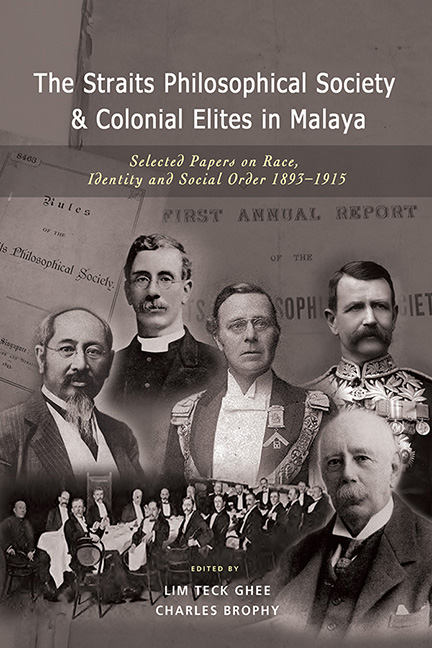 The Straits Philosophical Society and Colonial Elites in Malaya
The Straits Philosophical Society and Colonial Elites in Malaya Published online by Cambridge University Press: 09 January 2024
Editors’ Note
One important element of the social reform movement amongst the Straits Chinese was the anti-opium movement which called for the prohibition on the opium trade in the colony and treatment for opium smokers. As early as 1894, Straits Chinese members took the lead in representing the anti-opium cause at public meetings in Singapore. In doing so they challenged the view common in European circles, and expressed in the papers to the Society, that the Chinese community was averse to the banning of opium, Lim would continue to write on the issue in the Straits Chinese Magazine, seeing the issue as an opportunity to mobilize the Chinese community in Singapore. As highlighted in his paper to the Society, Lim was foremost in the use of medical arguments which highlighted the deleterious effects of opium, as well as in rebutting the belief that without opium, worse abuses would follow. Although he perceived that alcohol was no less an evil, Lim suggested that this abuse was less common amongst the Chinese, easier to detect, and more easily treated. Together with his brother-in-law, Yin Suat Chuan, he founded in 1906 the Singapore Anti-Opium Society, and ran an experimental rehabilitation centre funded by Baba merchants. This influenced Wu Lien-teh to establish a similar clinic in Penang, where an anti-opium movement also emerged. The movement was also supported by prominent missionaries active in the Straits Philosophical Society: W. Murray and William Shellabear, whilst D.J. Galloway would sit on the Opium Commission in 1908. The Commission studied the opium problem and put forward recommendations to restrict, but not to prohibit, opium, thereby protecting the colony’s revenues.
Lim’s essay and J.G. Campbell’s response highlight that, beyond moral reform and economic concerns, ideas of race and racial susceptibility to substances such as opium and alcohol were important to debates on social policy and reform.
Gentlemen, in my humble opinion, there is not much to choose between opium and alcohol, at least from the ethical and scientific point of view. It seems a great pity, indeed, that public discussion of the evil of the opium habit has led to the studious elaboration of facts and fancies into a very taking kind of hypothesis that as compared with alcohol-drinking the opium habit is, after all, a very desirable kind of virtue.
To save this book to your Kindle, first ensure [email protected] is added to your Approved Personal Document E-mail List under your Personal Document Settings on the Manage Your Content and Devices page of your Amazon account. Then enter the ‘name’ part of your Kindle email address below. Find out more about saving to your Kindle.
Note you can select to save to either the @free.kindle.com or @kindle.com variations. ‘@free.kindle.com’ emails are free but can only be saved to your device when it is connected to wi-fi. ‘@kindle.com’ emails can be delivered even when you are not connected to wi-fi, but note that service fees apply.
Find out more about the Kindle Personal Document Service.
To save content items to your account, please confirm that you agree to abide by our usage policies. If this is the first time you use this feature, you will be asked to authorise Cambridge Core to connect with your account. Find out more about saving content to Dropbox.
To save content items to your account, please confirm that you agree to abide by our usage policies. If this is the first time you use this feature, you will be asked to authorise Cambridge Core to connect with your account. Find out more about saving content to Google Drive.